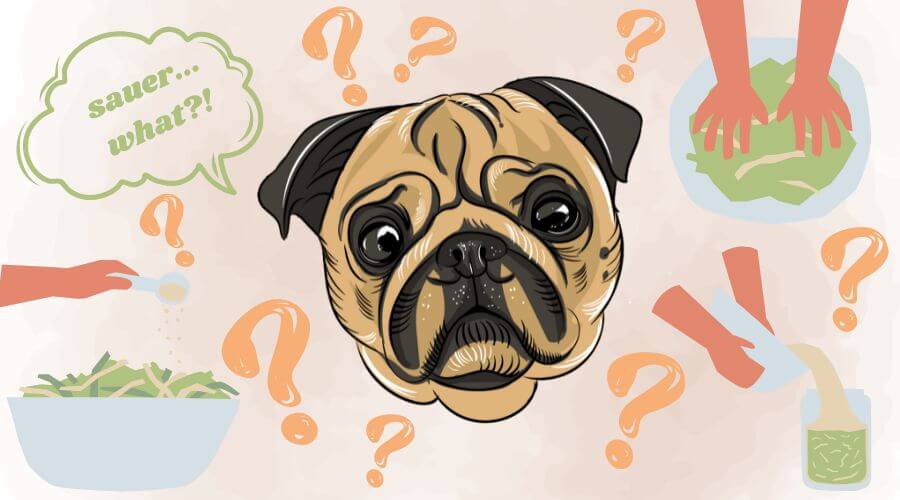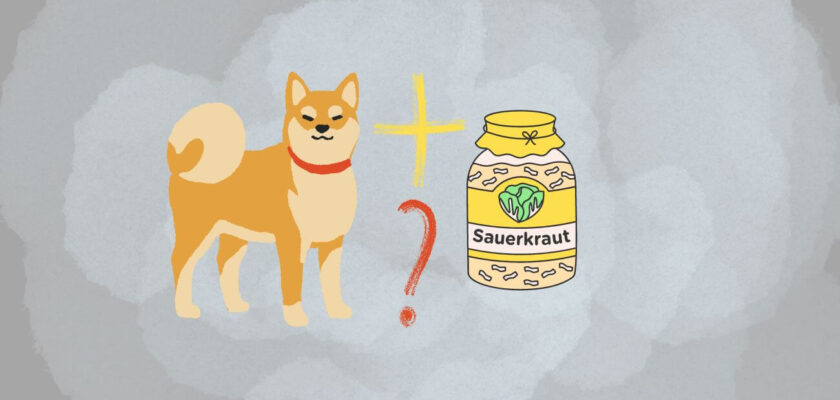Long Story Short
- The legendary sauerkraut is actually just fermented cabbage soaked in a blend of brine and salt. It’s like the cabbage took a magical bath and came out as a tangy, flavorful treat! ✔️
- Can dogs eat sauerkraut? The answer is YES! Pups can have a little sauerkraut as a treat and reap the benefits of boosted digestion, probiotics, and even weight loss. ✔️
- But as with anything good in life, there are some risks to be aware of. Watch out for harmful bacteria and a high sodium content in sauerkraut that could potentially harm your pup. ⚠️
- Fear not, my paw-some friend! Just like teaching your dog to fetch, it’s important to take safety precautions when feeding them sauerkraut. Start with a small amount, check the ingredients list, and you’ll both be chomping on sauerkraut together in no time! ✔️
Sauerkraut is a type of fermented cabbage that is made by pickling the cabbage in brine and salt. Typically served as a side dish, sauerkraut has a sour and tangy flavor that many people enjoy. It is a popular condiment in Europe and has many health benefits for humans. But can dogs eat sauerkraut with just as much benefit?
Health Benefits of Sauerkraut for Dogs
So, can dogs eat sauerkraut? You betcha! Your furry buddy can enjoy some health benefits from nibbling on a bit of sauerkraut:
- Aids in digestion: The fermentation process makes cabbage way easier for your pup’s tummy to handle.
- Packed with probiotics: These good little bugs keep your dog’s gut in tip-top shape – especially helpful if they’re on antibiotics.
- Full of fiber: No more tummy troubles for your pup, thanks to sauerkraut’s fiber content!
- Helps with weight loss: Low-calorie and high-fiber, sauerkraut can help your dog maintain a healthy weight.
- Controls blood sugar: High in fiber and low in carbs, this fermented treat is great for diabetic dogs.
- Reduces inflammation: Less stomach troubles for your pup.
- Vitamins and minerals galore: Vitamin C, B vitamins, and potassium? Yes, please!
- Antioxidant-rich: Keep your dog’s cells protected from damage with this natural source of antioxidants
Editor’s Note 🐕
The health benefits of sauerkraut for dogs are still being investigated and may not apply to all pups. Always chat with your vet before making any dietary changes for your fur baby.

Risks of Feeding Your Dog Sauerkraut
Hold up! Can dogs eat sauerkraut without risks? Not quite. While there are perks to feeding them sauerkraut, you should also be aware of these potential hazards:
- Harmful bacteria: The fermentation process can introduce some not-so-friendly bacteria like listeria and salmonella, which can cause food poisoning (and some stinky business).
- Imbalanced diet: Sauerkraut is high in sodium, which could lead to dehydration and salt poisoning.
- Spices and flavors: Some added ingredients (like garlic, onion, and caraway seeds) can be harmful to your pup’s tummy.
Store-Bought Sauerkraut vs. Homemade Sauerkraut
If you’re ready to share sauerkraut with your pup, you might wonder if you should go for store-bought or homemade. Homemade sauerkraut has some advantages:
- Fresher ingredients: More nutrients for your dog to enjoy!
- Lower sodium levels: A safer option for dogs on low-salt diets.
- No preservatives: A more natural choice for your furry friend.
But does it mean that all store-bought sauerkraut is not good for dogs? Of course, it doesn’t. All you’ve got to do, though, is carefully check the ingredients. The less you understand, the worse it is.
How to Safely Feed Sauerkraut to Your Dog
Before you start dishing out sauerkraut, follow these safety tips:
- Start small: Test your dog’s tolerance with a tiny amount first. Some dogs want sauerkraut, but they don’t necessarily want to eat it (no eat, only food 😹).
- Mix it up: Combine sauerkraut with their regular dog food.
- Check the ingredients: Opt for fresh, healthy ingredients without harmful additives.
- Choose pasteurized sauerkraut: It’s safer because it kills off bad bacteria.
- Skip canned sauerkraut: It’s higher in sodium and not as healthy.

Can Dogs Eat Sauerkraut?
So, can dogs eat sauerkraut? Absolutely! With digestion-boosting, probiotic-packed, weight loss-friendly benefits, sauerkraut can be a fantastic addition to your dog’s diet. Just be mindful of the risks and follow our safety tips to keep your pup healthy and happy. Enjoy the sauerkraut adventures with your furry friend!
Frequently Asked Questions
Is Sauerkraut Good for Dog’s Stomach?
Yes, sauerkraut is good for a dog’s stomach. It contains good bacteria, can act as a probiotic, and improves digestion.
Can Sauerkraut Cause Diarrhea in Dogs?
Sometimes, yes, it can. It usually happens when a dog is given too much of it, or if the sauerkraut has gone bad. The culprit can also be too many preservatives or additives.
Can Dogs Eat Sauerkraut with Caraway Seeds?
Nope, caraway seeds are a big NO-NO. They are very toxic to dogs
What Fermented Foods Can Dogs Eat?
In addition to sauerkraut, other fermented foods that are safe for dogs to eat include yogurt, kefir, kimchi, and tempeh.
Similar Posts:
- Can Dogs Eat Sour Cream? How Much Sour Cream Can You Give Your Dog?
- Can Dogs Eat Cheese? Is It Safe for Dogs?
- Can Dogs Eat Soy Sauce? What Is Salt Poisoning?
- Can Dogs Eat Ham? Is It Bad for Dogs? | Risks and Benefits
- Can Dogs Eat Pickles? The Pros and Cons of Letting Your Dog Eat Pickles
- Can Dogs Eat Kale? Weighing the Risks and Benefits
- Can Cats Eat Bacon? Is Raw Bacon Safe For Cats To Eat?
- Can Dogs Eat Shrimp? | The Beloved Seafood and Dogs

